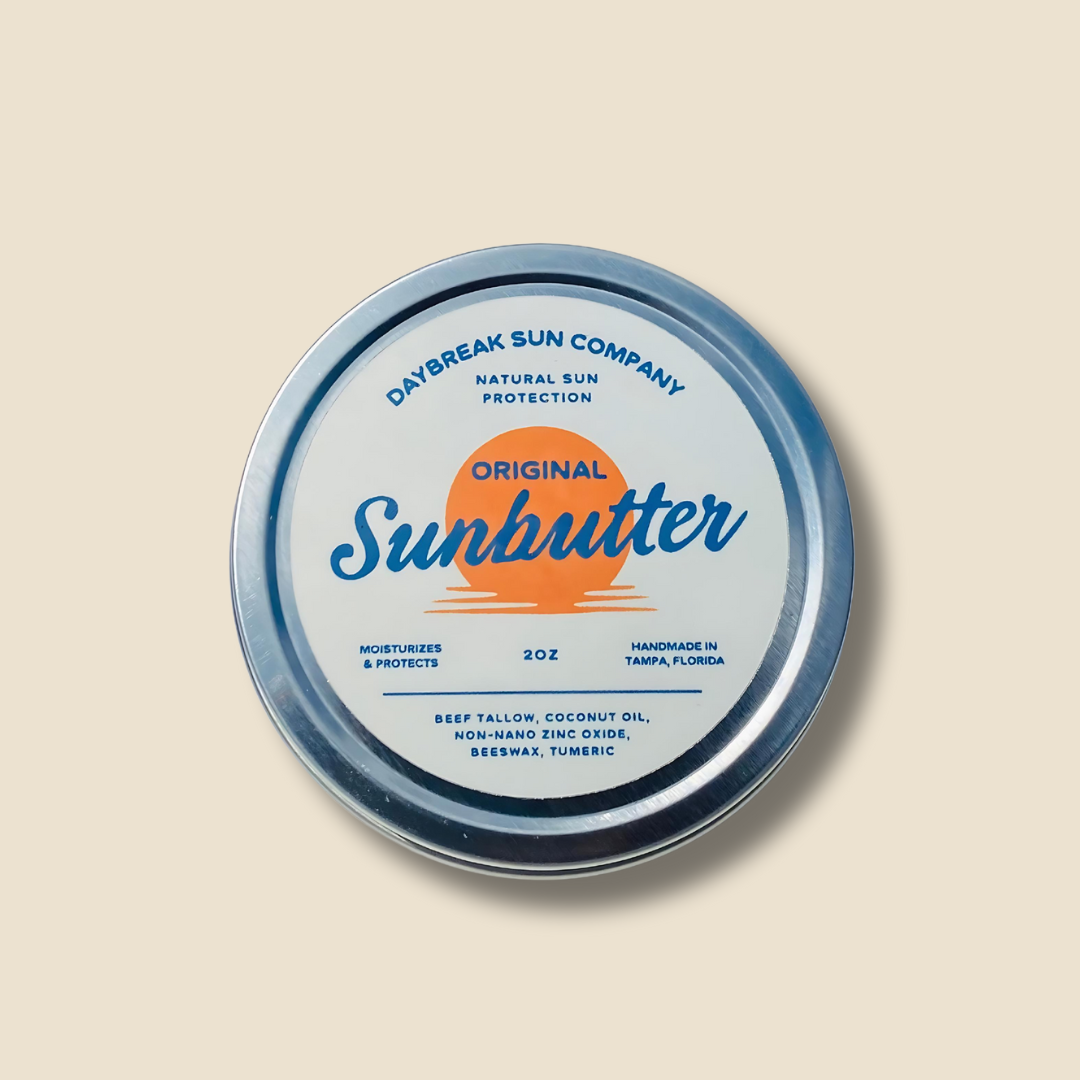Pro-sun propoganda
Simple is Better
We set out to make a sun protectant that we could feel good wearing. A product that truly keeps the wearer and the environment 100% safe.
Countless hours of research went into crafting the Sunbutter formula. We summarize our findings below. You can rest assured our Original Sunbutter and all Daybreak products are backed by the latest research.
*best taken with a dash of common sense, logic, and critical thinking.

What's wrong with Sunscreen?
There are two main issues with your average sunscreen.
1. They damage coral reefs.
The active ingredients, when they leach into the ocean, stress and bleach coral reefs. Coral reefs support over 25% of all marine life (Coral Reef Alliance) not to mention the protection they provide for our coastlines, food production, the many medicines that have been formulated from reef research, and the fact they are awesome to look at and explore.
2. They disrupt your endocrine system (your hormones)
Every common active ingredient, oxybenzone, octinoxate, octisalate, octocrylene, homosalate and avobenzone, are all absorbed into the skin when you apply your sunscreen. Researchers have found these compounds present in blood, urine, and breast milk samples weeks after use (Nohynek et. al).
So what? What are these chemicals doing to our body? We all are familiar with the hormone called testosterone. In a study done in humans researchers found testosterone levels were significantly decreased when exposed to homosalate alone or in combination with avobenzone (Lee et. al) (can virtually guarantee your sunscreen contains these ingredients). Testosterone has obvious impacts in men but testosterone plays a vital role in women too. In women, proper testosterone/estrogen balance is essential for bone and muscle health, mood and energy, fertility, and regular cycles.
Interestingly, recent science has shown that sun exposure can boost your testosterone levels. A 2021 study found that over the span of a month, men who got 20 to 30 minutes of sun exposure 2 to 3 times a week had notably higher levels of testosterone (Parikh et. al). Not only is regular sunscreen decreasing your testosterone levels but robbing you of a natural boost to a very important mood, energy, reproductive, muscle, bone and brain function hormone. “But too much testosterone is a bad thing” going in the sun isn’t a steroid (nor is Sunbutter), it’s a return to your body’s natural homeostatic balance.
Fda and spf regulations
The fda regulates all sunscreens in the United States. Sunscreens are considered otc medications. In Europe and Asia, where sunscreens are classified as cosmetic products, there is much less regulation on ingredients. One would assume this means our standards here in the US would be more strict. However, out of 51 commercially available sunscreens, only about 30% passed EU standards while 94% passed FDA standards (ewg).
So what is SPF? It stands for Sun Protection Factor but it is a measure of UVB protection. UVB is only half the story. While UVB is responsible for sunburns and common, less serious skin cancers, uva is responsible for immune suppression, formation of free radicals, and development of melanoma (ewg).
None of our products are regulated by the FDA. The registration fee is outrageous and as you can see it isn't worth much. Due to this, We can't claim an SPF value for the Original Sunbutter but honestly, we wouldn't want to anyway. Use your judgment and experience to determine how long before you have to reapply. Everyone's skin is different and our Original Sunbutter is good for everyone.

Seed Oils
Seed oils. These guys have gotten famous like the Kardashians. Here’s what we know.
- Seed oils are things like canola, Flaxseed, sunflower, safflower, soybean, olive, and corn oil.
- Seed oils contain disproportionate levels of (way more) omega 6 polyunsaturated fats (PUFAs) to omega 3 or saturated fats.
- The most common omega 6 polyunsaturated fat is linoleic acid (LA).
- LA is essential nutrient in the human diet. However, Americans are consuming 14 - 25 times more LA than omega 3’s (Mercola and D’Adamo).
- An excess of LA leads to oxidized linoleic acid metabolites (OXLAMs). OXLAMs are associated with cardiovascular disease, cancer, and Alzheimer's disease, among other chronic illnesses (Mercola and D’Adamo).
- PUFAs have been shown to moderately increase risk of skin cancer (18% increase) (Park et. al).
- Seed oils are common in a lot of “all natural” products.
- Coconut oil used in our Original Sunbutter boasts the strongest omega 6:3 ratio of any plant oil. Around 2% linoleic acid content (Handayani et. al)
- Linoleic acid aggravates UV skin damage while topical cholesterol (found in our beef tallow used in the Original Sunbutter) protects the skin from UV induced damage (Byun et. al)
Don't settle this summer
It's pretty obvious chemicals aren't the answer for fun in the sun. Sunbutter gives you peace of mind as you soak in that warm summer sun.


